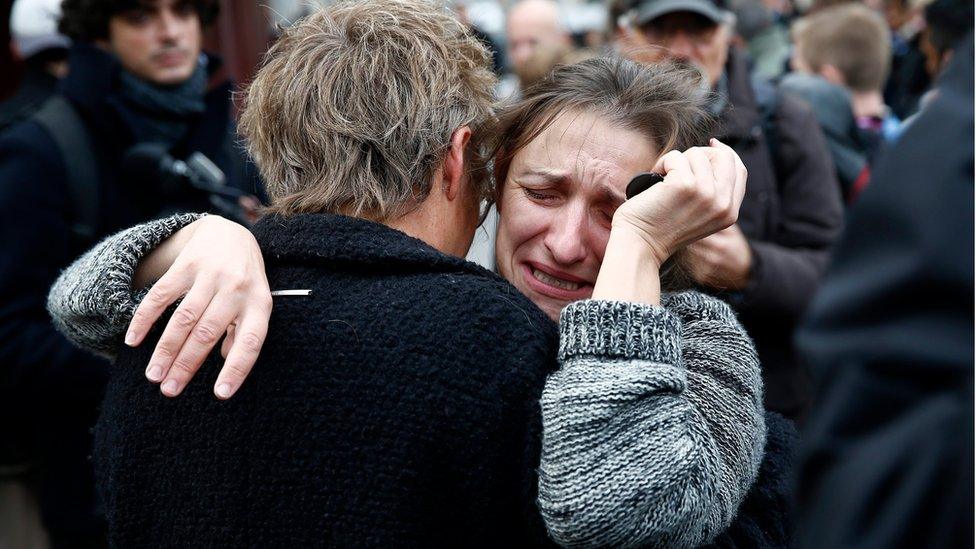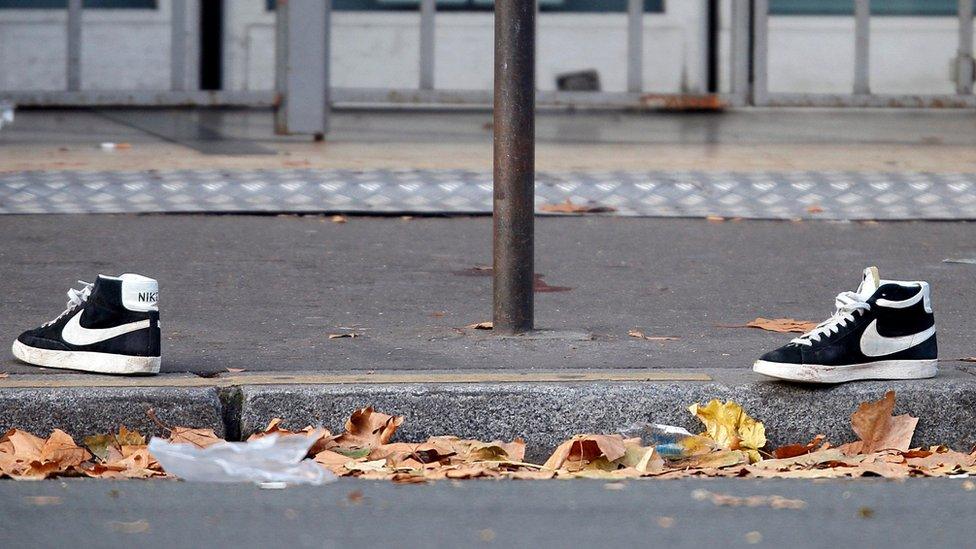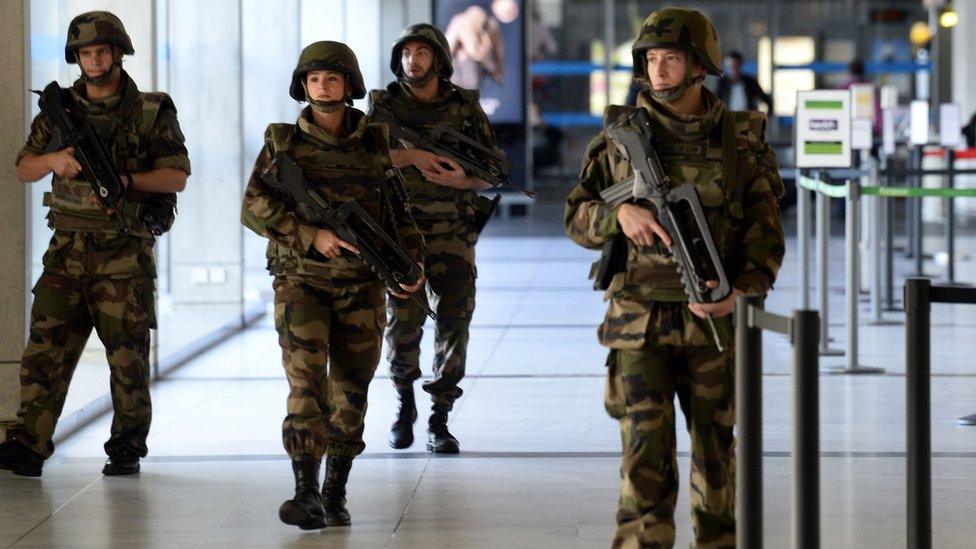Paris attacks: Hollande blames Islamic State for 'act of war'
- Published
People could be seen escaping from the Bataclan concert hall shortly after a series of explosions
The near-simultaneous attacks in Paris that killed at least 128 people were an "act of war" organised by the Islamic State (IS) militant group, French President Francois Hollande says.
He said the attacks, carried out by eight gunmen and suicide bombers, were "organised and planned from outside".
The targets included bars, restaurants, a concert and a high-profile football match. IS claimed the attacks.
Several arrests have been made in Belgium, the justice minister says.

The investigation
Belgian Justice Minister Koen Geens said "a number of'' arrests have been made in Brussels relating to the Paris attacks.
Belgian TV says five people were detained in the suburb of Molenbeek.
The arrests come after a car with Belgian registration plates was seen close to one of the attacks - the Bataclan concert hall.
As the investigation continues, French police are trying to establish the attackers' identities.
One of those involved in the Bataclan concert hall attack is reported to have been a French citizen with a history of involvement in radical Islam.
A Syrian passport was found next to the body of one of three suicide bombers who struck near the Stade de France stadium during the game.
A Greek minister says the passport belonged to a Syrian refugee who passed through the island of Leros. An Egyptian passport has also been linked to the attacks.
Meanwhile, UK official sources have told the BBC they believe a Syrian cell, recently returned to France, was behind the attacks.

How the attacks unfolded
Jerome Bartelemy survived the concert hall shootings: ''They told us to lie down... I saw him shoot someone, then I understood''
Mr Hollande imposed a state of emergency, after the worst peacetime attack in France since World War Two. It is also the deadliest in Europe since the 2004 Madrid bombings.
Hospital officials now put the number of injured at more than 300. Eighty are in a critical condition.
The violence began soon after 21:00 (20:00 GMT) as people were enjoying a Friday night out in the French capital.
A gunman opened fire on Le Carillon bar in the rue Alibert, not far from the Place de la Republique, before heading across the road to Le Petit Cambodge (Little Cambodia), killing at least 12 people.
"We heard the sound of guns, 30-second bursts. It was endless. We thought it was fireworks," Pierre Montfort, a resident living close to Le Petit Cambodge, said.
A few streets away, diners sitting on the terrace of La Casa Nostra pizzeria in rue de la Fontaine au Roi, were also fired on, with the loss of at least five lives.
At around the same time, on the northern outskirts of Paris, 80,000 people who had gathered to watch France play Germany at the Stade de France heard three explosions outside the stadium.
President Hollande was among the spectators and was whisked away after the first blast.

Attack sites:
La Belle Equipe, external, 92 rue de Charonne, 11th district - at least 19 dead in gun attacks
Le Carillon bar, external and Le Petit Cambodge restaurant, external at rue Alibert, 10th district - at least 12 dead in gun attacks
La Casa Nostra restaurant, external, 92 rue de la Fontaine au Roi, 11th district - at least 5 dead in gun attacks
Stade de France, external, St Denis, just north of Paris - explosions heard outside venue, three attackers dead
Bataclan concert venue, 50 Boulevard Voltaire, 11th district - stormed by four gunmen, at least 80 dead


The 1,500-seat Bataclan concert hall suffered the worst of Friday night's attacks. Gunmen opened fire on a sell-out gig by US rock group Eagles of Death Metal, killing at least 80 people.
"At first we thought it was part of the show but we quickly understood," Pierre Janaszak, a radio presenter, told AFP news agency.
"They didn't stop firing. There was blood everywhere, corpses everywhere. We heard screaming. Everyone was trying to flee."
He said the gunmen took 20 hostages, and he heard one of them tell their captives: "It's Hollande's fault, (...) he should not have intervened in Syria".
Within an hour, security forces had stormed the concert hall and all four attackers there were dead. Three had blown themselves up and a fourth was shot dead by police.

BBC correspondents tweet from the scene in Paris:
Gavin Hewitt, external: Here in Paris, the police have banned all demos and gatherings in the city and the suburbs until Thursday #parisattacks
Imelda Flattery, external: A woman on a bicycle rides past the Belle Equipe restaurant. Her sobbing audible above the clicks of press cameras.
Gavin Lee, external: "I looked outside my window + 2 men were dead outside, I saw the attacker too. I can't stop shaking" Marie, lives above Casa Nostra cafe #Paris

Islamic State released a statement on Saturday saying "eight brothers wearing explosive belts and carrying assault rifles" had carried out the attacks on "carefully chosen" targets, and were a response to France's involvement in the air strikes on IS militants in Syria and Iraq.
Shortly before, President Hollande said France had been "attacked in a cowardly shameful and violent way".
"So France will be merciless in its response to the Islamic State militants," he said, vowing to "use all means within the law.. on every battleground here and abroad together with our allies".
Matthew Price assesses the mood on the streets of Paris
Some of the world's most famous buildings have been lit in solidarity with France
Many officials buildings as well as Disneyland Paris have been closed, sports events have been cancelled and large gatherings have been banned for the next five days. Residents are being urged to donate blood.
Police believe all of the gunmen are dead - seven killed themselves with explosives vests and one was shot dead by the security forces - but it is unclear if any accomplices are still on the run.

West inevitable target: Frank Gardner, BBC Security Correspondent
From the moment that US-led coalition forces began to check the advance of IS's rampage across Iraq in the summer of 2014 it was inevitable the West would become their target.
France is especially vulnerable. Its open borders have allowed easy access to the powerful automatic weapons used in all the Paris attacks this year.
At the same time it has thousands of troops deployed overseas and it's been confronting jihadists on three continents.
Its controversial ban on the burka face veil for women has been interpreted by some Muslims as being anti-Islamic.
But if IS is indeed behind this weekend's carnage then, taken with their claim of bringing down the Russian airliner over Sinai in October, it marks an alarming step-up in their global reach.
Largely because of the ongoing civil war in Syria there remains a significant pool in Europe of returning jihadists, trained and inspired to carry out attacks in their own countries.

World response
Mr Hollande has been speaking by phone to many world leaders.
Reacting to the attacks, US President Barack Obama spoke of "an outrageous attempt to terrorise innocent civilians" and called a meeting of his National Security Council.
UK PM David Cameron said he was shocked and pledged to do "whatever we can to help".
The Vatican called it "an attack on peace for all humanity" and said "a decisive, supportive response" was needed "on the part of all of us as we counter the spread of homicidal hatred in all its forms".

Paris is in mourning after Friday night's wave of attacks

A pair of abandoned shoes lies close to the Bataclan concert hall, scene of the deadliest attack

French security forces are now on the highest state of alert